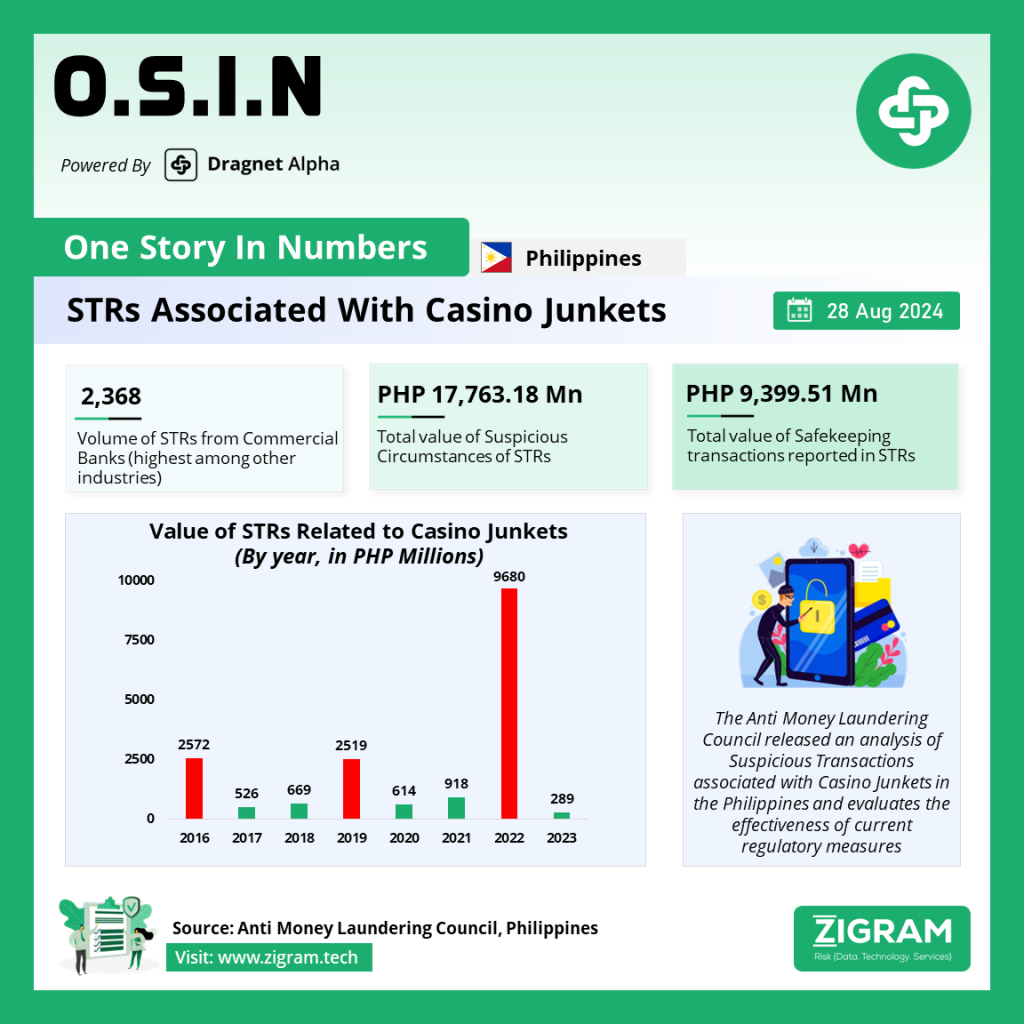Suspicious Transactions And Casino Junkets
Casino junket, also known as casino-based tourism, involves arrangements between casinos and operators to bring in wealthy gamblers for exclusive gaming experiences. These operators offer luxury services, including all-expenses-paid trips and top-tier accommodations, earning a percentage of the money gambled.
While lucrative for both players and casinos, the Financial Action Task Force (FATF) identified casino junkets as a risk in 2009 due to the cross-border movement of funds and people, raising concerns about transparency. The Asia/Pacific Group (APG) highlighted in the Philippines’ 2019 Mutual Evaluation Report that the growing casino sector presents significant money laundering (ML) risks, particularly through junket operations and related tourism.
The report recommended stronger market entry controls and extending Anti-Money Laundering/Combating the Financing of Terrorism (AML/CFT) regulations to junket operators. Despite progress, FATF still sees a need for improved supervision to mitigate these risks.
This study released by the Anti Money Laundering Council in the Philippines aims to assess the extent of suspicious activities related to junket operations in the Philippines and the associated ML/TF risks, complementing ongoing risk assessments by casino regulators.
Casino junkets have long been a focal point in anti-money laundering (AML) efforts due to their potential for facilitating illicit financial activities. This analysis delves into two datasets comprising Suspicious Transaction Reports (STRs) that include “junket” in the narrative field, highlighting the key trends, suspicious circumstances, and transaction types associated with these reports.
Dataset 1: An Overview
Dataset 1 comprises 3,308 STRs, valued at PHP17.79 billion, submitted by various financial institutions and land-based casinos. The majority of these STRs originate from commercial banks/non-expanded commercial banks (71.58%) and land-based casinos (27.66%). Despite the smaller share in volume, land-based casinos accounted for a higher total value of STRs compared to commercial banks.
Key Observations:
– Increasing Volume of STRs: The volume of STRs related to casino junkets shows an upward trend starting from 2021, peaking in 2023, despite the dataset covering only the first 18 days of that year. A significant portion of these STRs involved 17 individuals suspected of participating in a Ponzi or pyramid scam.
– Spike in STR Value: The value of junket-related STRs exhibited significant spikes every three years, particularly in 2022, when the aggregate value reached PHP9.68 billion, constituting 54.42% of the total STR value in Dataset 1. This spike is primarily attributed to 13 STRs related to the safekeeping of playing chips, each valued between PHP100 million and PHP300 million.
Suspicious Circumstances And Predicate Crimes:
– The majority of STRs were filed due to suspicious circumstances under RA No. 9160, as amended, with “no underlying legal or trade obligation, purpose, or economic justification” (SI1) accounting for over half of the reports in terms of both volume (58.71%) and value (54.04%).
– Predicate crimes were relatively rare, representing only 2.90% of the total volume and 0.14% of the total value. The most common predicate crime cited was “Fraudulent practices and other violations under the Securities Regulation Code of 2000,” which accounted for 2.24% of the total STR count.
Transaction Types:
– The dataset reveals a wide variety of transactions associated with casino junkets, with “Safekeeping” (ACHF) transactions standing out as the most significant in terms of both volume (16.96%) and value (52.84%).
– Cash-related transactions, including deposits and chip exchanges, also featured prominently, underscoring the heavy use of physical cash in these operations, which poses challenges for AML monitoring.
Dataset 2: Insights From High-Risk Integrated Resorts
Dataset 2 provides insights into 4,110 STRs filed by high-risk integrated resorts between 2020 and 2022, with Casino A being the most prominent, accounting for 54.70% of the reports.
Key Findings:
– Prominence of Safekeeping Transactions: Similar to Dataset 1, “Safekeeping” transactions were dominant in Dataset 2, representing 19.90% of the total volume and 65.10% of the total value.
– Use of Physical Cash: The data suggests extensive use of physical cash in high-risk integrated resorts, with significant volumes of chips-to-cash and cash-to-chips transactions. This reliance on cash makes it difficult to trace and monitor potentially illicit activities.
– Suspicious Circumstances: The majority of STRs in Dataset 2 were also filed due to suspicious circumstances, particularly SI1, which accounted for 48.35% of the volume and 75.35% of the value.
– Expanded Predicate Crimes: In addition to the predicate crimes noted in Dataset 1, Dataset 2 identified 16 other predicate crimes specific to the casino sector, including qualified theft, jueteng and masiao, and violations related to anti-trafficking and smuggling.
The analysis of these datasets highlights the ongoing challenges in monitoring and regulating casino junket operations. The reliance on physical cash and the complex nature of transactions in this sector make it a high-risk area for money laundering activities. The significant spikes in STR volumes and values underscore the need for continuous vigilance and enhanced regulatory measures to mitigate the risks associated with casino junkets.
Read the full report here.
Know more about the product: Dragnet Alpha
Click here to book a free demo.
- #CasinoJunkets
- #MoneyLaundering
- #AML
- #PhilippinesCasinos
- #RegulatoryCompliance
- #FinancialCrime
- #FATF
- #GamblingRisks
- #MLTF
